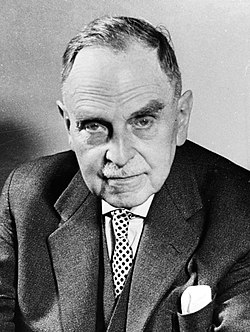
The Otto Hahn Prize is awarded biennially jointly by the Society of German Chemists (Gesellschaft Deutscher Chemiker), the German Physical Society (Deutschen Physikalischen Gesellschaft) and the city of Frankfurt am Main for outstanding achievement in the field of chemistry, physics or applied engineering science. It was established in 2005 by the merger of the previous Otto Hahn Prize for Chemistry and Physics and the Otto Hahn Prize of the City of Frankfurt am Main. [1] The award is presented in the St. Paul's Church, Frankfurt am Main. [2]
Contents
- Recipients: Otto Hahn Prize for Chemistry and Physics
- Recipients: Otto Hahn Prize of the City of Frankfurt am Main
- See also
- References
- External links
The award named after the German nuclear scientist and Nobel laureate Otto Hahn [3] and consists of a gold medal and a prize of 50,000 euros. It is awarded alternatively for Chemistry and Physics. [4]